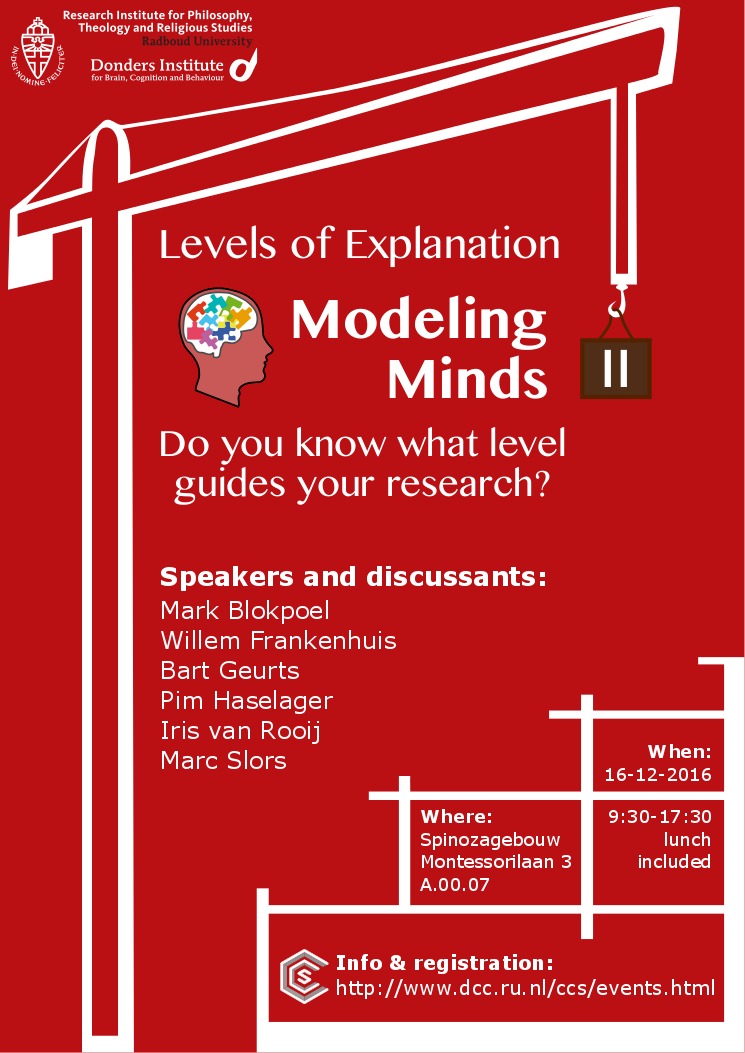Upcoming events:
Past events:
Modeling Minds II: Levels of Explanation.
16th of December 2016
Radboud University Nijmegen,
Spinoza building, Donders Room A.00.07
Tweet

WATCH US LIVE!
One of the main aims of the science of brain, cognition and behaviour is to provide explanations of cognitive phenomena. Answering different types of questions about a given phenomenon (e.g., what? how? why? where? when?) can be seen as providing explanations at different levels. This idea of ‘levels of explanation’ is of prime importance for understanding explanatory practices in cognitive science. For instance, the (kinds of) questions you ask in your research guide the methods you employ and the answers you formulate. Also, it is necessary to be able to tell whether two different explanations are situated at the same level and are for instance competing, or whether they span two different complementary levels and are potentially consistent. In spite of the importance of clarity on such issues, much ambiguity and disagreement remains about what exactly defines the different levels of explanation, and how they are related to each other.
In this workshop, we aim to bring together philosophers, computational modelers and cognitive (neuro)scientists to present and discuss different perspectives. The goal is to build common ground on both the theoretical issues related to levels of explanation and how they inform and guide the daily practice of studying the mind and brain.
Questions addressed include:
- Which levels of explanation do you distinguish?
- What are the relations between the different levels?
- At which level do you operate in your research?
- Why is it important to explicate at which level an explanation operates, or why not?
- Is there a natural or primary level of explanation for cognitive science, or does it differ per (sub)discipline?
This workshop is a second event in the Modeling Minds workshop series jointly organized by the Donders Center for Cognition and the Philosophy of Mind and Language group at the Radboud University Nijmegen.
Program
| 16th of December (Friday) | |
| 09:00 - 09:30 | Registration, coffee & tea |
| 09:30 - 09:45 | Welcome |
| 09:45 - 10:45 | Willem Frankenhuis |
| Levels of explanation in biology | |
| 10:45 - 11:00 | Coffee & tea break |
| 11:00 - 12:00 | Bart Geurts |
| No sense without competence | |
| 12:00 - 12:30 | Exercise |
| 12:30 - 13:30 | Lunch |
| 13:30 - 14:30 | Pim Haselager |
| Levels of agency | |
| 14:30 - 15:30 | Exercise |
| 15:30 - 15:45 | Bathroom break |
| 15:45 - 17:00 | Grand finale: panel and plenary discussion |
Abstracts: Click here
Registration: Click here
Organizers: Katja Abramova, Iris van de Pol

Modeling Minds
23-24th of April 2015
De Lindenberg, Nijmegen
Since its inception, cognitive science has been built on modeling as a core research methodology. Models come in many different kinds and forms, including neural network, symbolic, logicist, probabilistic (Bayesian), heuristic, dynamical, robotic, and evolutionary models. Also, models can be used for many different purposes, including description, prediction, explanation, emulation, and prescription.
In this twoday workshop, we focus specifically on the explanatory role of models in cognitive science, spanning the full diversity of modeling types. Even though explanation is a key scientific aim of modeling in cognitive science, there is no consensus about what makes a model explanatory. It’s become evident that making good predictions is not sufficient (and possibly, not even necessary) for good explanations. But then what is? Recently, it has been proposed that models that describe mechanisms may serve as explanations. Yet, questions remain on how mechanisms explain. Besides, even if mechanisms can suffice as explanations, it isn’t clear if only mechanisms explain.
This workshop brings together philosophers and modelers in the cognitive sciences to exchange ideas on what, how and in what sense models explain. With this workshop we aim to build more common ground between cognitive scientists interested in models as explanations, and to make visible the diversity of contemporary modelling approaches and their views on explanation.
Slides from the workshop are available here
Organizers
Katja Abramova
1. Radboud University, Donders Institute for Brain, Cognition and Behaviour, Computational Cognitive Science
2. Radboud University, Department of Philosophy, Theology and Religious Studies, Philosophy of Mind and Language
Registration
Via email to e.abramova'at'ftr.ru.nl
Program
| 23rd of April (Thursday) | |
| 9:00 | Registration |
| 9:30 | Welcome |
| 9:45-10:15 | Introduction to the workshop & start-up activity | 10:15-11:15 | Sanneke de Haan, University of Amsterdam |
| Does explanation require the uncovering of underlying mechanisms? | |
| 11:15-11:30 | Coffee break |
| 11:30-12:30 | Nina Gierasimczuk, University of Amsterdam |
| Investigating human reasoning through the lens of logic and games | |
| 12:30-14:00 | Lunch break |
| 14:00-15:00 | Ralf Cox, University of Groningen |
| Fractal coordination dynamics in human behaviour | |
| 15:00-16:00 | Catarina Dutilh Novaes, University of Groningen |
| Reasoning biases and non-monotonic logics: the case of preferential logics | |
| 16:00-16:15 | Coffee break |
| 16:15-17:15 | Panel discussion |
| 24th of April (Friday) | |
| 10:00-10:15 | Intermediate summary/reflections on Day 1 |
| 10:15-11:15 | Pim Haselager, Radboud University Nijmegen |
| Robots as models | |
| 11:15-11:30 | Coffee break |
| 11:30-12:30 | Jelle Zuidema, University of Amsterdam |
| Nonsymbolic models of compositional semantics | |
| 12:30-14:00 | Lunch break |
| 14:00-15:00 | Matteo Colombo, Tilburg University |
| Bayesian cognitive science, under-considered alternatives, and the value of specialization | |
| 15:00-16:00 | Johan Kwisthout, Radboud University Nijmegen |
| A complexity-theoretic perspective on approximate Bayesian inferences | |
| 16:00-16:15 | Coffee break |
| 16:15-17:15 | Panel discussion |
| 17:15-17:30 | Closing |
